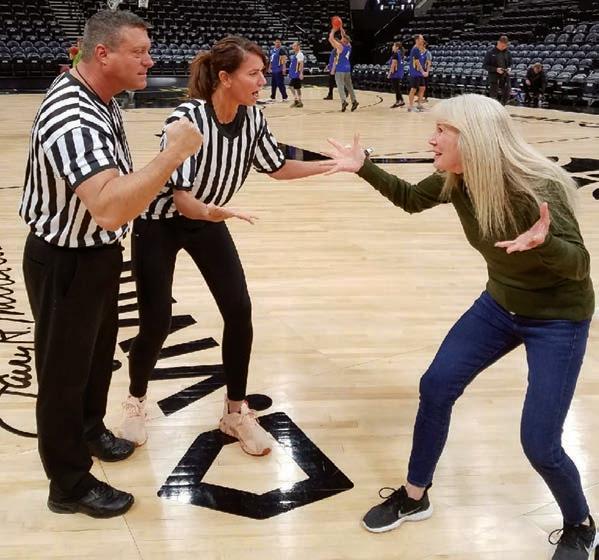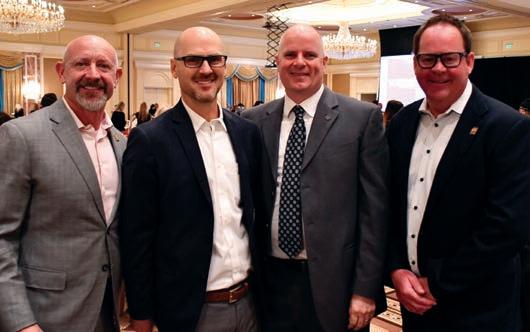
7 minute read
READY TO GET REAL ABOUT REAL ESTATE?


As part of the legendary Berkshire Hathaway family of companies, we have the depth, strength and brand power to help grow your real estate business. Our network extends globally in reputation and strength. Locally, our company is the largest brokerage in Utah, ensuring that your property reaches a broad audience of real estate professionals and buyers. We are committed to providing you with the resources and support that will create greater success and enjoyment in your real estate career. So, talk with us at Berkshire Hathaway Utah Properties and let’s get you settled without ever settling for less
Our professional in-house marketing agency provides the best in graphic design, print marketing, and digital advertising.
Scan the QR codes with your smartphone’s camera to view some of our in-house publications online.
2023 RPAC Basketball Championship
The Salt Lake Board of Realtors® held its first Basketball Championship Tournament Jan. 18 at the Vivint Arena, home of the Utah Jazz. Eight teams participated in the event with roughly 75 players in a single-elimination bracket. Teams included: Realtypath, Century 21, Summit Sotheby’s International Realty, Coldwell Banker, First American Title Company, Zander Real Estate Team, Edge Homes, and Keller Williams. Edge Homes was the winning team (pictured on magazine cover).









Make the Code of Ethics a Priority

By The Professional Standards Committee Salt Lake Board of Realtors®
Case No. 1
A listing agent for a property received an offer from a buyer to purchase the property. The buyer was also a Realtor® and the Respondent in this ethics complaint. The buyer and seller entered a contract to purchase the property. Soon after the buyer and seller entered the contract, the listing agent discovered the property was being advertised by the buyer without permission or knowledge of the listing agent or the owner. The purchase contract was not assignable. Photos were taken of the property without the knowledge or permission of the owner or the listing agent. The photos were used in the advertising of the property. A private email containing information about the property went to over 900 potential buyers.
The email contained the following generic small-print disclaimers: House is being sold as-is, and buyer is to pay all closing costs. Buyer is not relying on any representations, whether written or oral, regarding the properties above. Price based on a cash or hard money offer and is net to seller. All offers on properties require a minimum of $5000 non-refundable earnest deposit and have an average 7 day close of escrow. Buyers to do their own independent due diligence. [The Company], LLC members, directors or employees make no guarantees concerning property condition, value, characteristics, or financial benefits. [The Company] is considering all of our options including selling the trust that the property is in. We may not own this home. We do not represent the seller. The information is provided as a courtesy and not meant for the purposes of marketing this home. We’re considering offering this contract for sale which will allow you to purchase the property.
Based on the evidence and testimony, the hearing panel determined that the Respondent is in violation of Article 1 of the Code of Ethics. The Respondent failed to act honestly with all parties when they allowed pictures of the home to be taken and used for advertising purposes without the knowledge or consent of the owner or the listing agent. The email advertisement was misleading, confusing, and misrepresentative. The Property was not assignable and not in a trust. It is unclear who the owner was. The relationship between the owner and the advertiser was also unclear.

The panel found the Respondent in violation of Article 12 of the Code of Ethics. The Respondent failed to be honest and truthful in their real estate communications and failed to present a true picture in their advertising, marketing, and other representations. They also failed to ensure their status as a real estate professional was readily apparent in their advertising, marketing, and other representations. The Respondent emailed an advertisement to sell the home without authority.
Case No. 2
The Respondent is an investor and licensed Realtor® who sent out an email advertisement that stated his company was “in possession of an Assignable Purchase Agreement that will allow us to purchase the property. We are considering selling the Purchase Agreement that will allow you to purchase this property.” The ad included other information about the specific property. The Property in question was actively listed on the MLS with a different agent at the time the Respondent sent out the above advertisement. The listing agent for this Property was not aware of the Respondent’s advertisement and did not consent to the Property being advertised in this way. An offer was presented on behalf of the Respondent to purchase the Property but it did not disclose until after it was accepted that the Respondent was a licensed agent. The offer included the phrase “and/or assigns” on the contract and was accepted by the seller. The contract was later cancelled by the Respondent. The Respondent recognized during the hearing that in the future he will handle these types of transactions properly and with the guidance of his broker. The hearing panel felt that the Respondent did not have authority to offer the Property for sale since the listing agent and seller were unaware of the Respondents advertisement of the “assignable contract.”
The hearing panel determined that the Respondent should have ensured that his status as a real estate professional was included on the offer prior to it being presented to the seller. The hearing panel noted that while contracts may be legally assigned, there are certain disclosures, consents and other legal documents that must be included to ensure the transaction is fully transparent to all parties. The Respondent was found in violation of Articles 4 & 12 of the Code of Ethics and required to take a 3 hour COE class and 3 hour live Advanced Forms CE class not for CE credit.
Case No. 3
The Complainant represented a buyer. The Respondent represented a seller. On Easter Sunday, the Respondent had an appointment to show a listing down the street from the Complainant’s listing. Believing it was the correct address, the Respondent accessed the key box on the Complainant’s listing and entered the property. The seller was at home in bed and was surprised by the Respondent. The Respondent apologized for the mix up and left the property. The Respondent did not try to contact the Complainant that day and was advised by her broker not to contact the Complainant at a later date. Concerning Article 1 of the Code of Ethics, the panel finds the Respondent in violation of this article. The trust that the public places in Realtors® by allowing access to their property is significant and must be taken seriously. Although this unauthorized entry was not intentional, the damage was done to the trust of the seller. Proper care must be taken to ensure only authorized entry is allowed into a seller’s property. The panel did not believe that proper care was taken in this instance. The Respondent was found in violation of article 15 of the Code of Ethics and required to pay a $250 fine and take a live COE course for no CE credit.
Case No. 4
The Complainant represented a Buyer. The Respondent represented a Seller. The Respondent had an appointment to take a Buyer through the Complainant’s listing. After the showing late in the evening, the
Respondent emailed the Complainant a question about accepting FHA loans but did not submit an offer. The next morning the Seller accepted an offer from a different buyer. The Respondent contacted the Complainant and they spoke over the phone. The Respondent was upset at not having a chance to submit an offer for her Buyer and the conversation deteriorated. Several texts were exchanged as well. The Respondent posted a comment on a private local agent page on the social media app Facebook. The post referenced the brokerage by the first letter of its name but not the full name. Stating that she had “just had a horrible experience” with this brokerage and to “Please advise your sellers better.” She further wrote, “I feel bad for these particular sellers that are being represented by them.” The Complainant confronted the Respondent about the post and the Respondent eventually took it down. Concerning Article 15 of the Code of Ethics, the panel finds the Respondent in violation of this article. The Respondent referenced the Complainant’s brokerage in a way in which they could be identified. Furthermore, by implying that the Complainant was not representing the Buyer in a competent way, the panel believes the Respondent violated this article by recklessly making a misleading statement about another real estate professional. The Respondent was required to take a live COE class and pay a $500 fine.
Case No. 5
The Respondent placed an advertisement on a Facebook group page that stated “Have one at 69% in Salt Lake County based on a very strong set of data. PM me for details.” There was nothing in the ad that indicated the Respondent was a licensed Realtor® nor did it state the brokerage firm he was currently affiliated with. In a private message from the Respondent to the Complainant, the Respondent did indicate that he would be the buying agent. However, this information was not contained in the Facebook ad for all to see. Respondent was found in violation of Article 12 of the Code of Ethics and was required to take a live COE class not for CE credit and pay a $150 fine.
2023 Forecast Breakfast




The Salt Lake Board of Realtors® held its annual Forecast Breakfast on Jan. 13. Lawrence Yun, chief economist of the National Association of Realtors®, was the keynote speaker. James Wood, Ivory-Boyer Senior Fellow at the Kem C. Gardner Policy Institute, was a featured speaker. Kenny Parcell, president of the National Association of Realtors® and a lifelong Utah resident, introduced Yun. Gary Cannon, owner of Cannon & Company Real Estate Service, was recognized for a lifetime investment of $100,000 to the Realtors® Political Action Committee (RPAC). Yun predicted that mortgage rates could fall as low as 5.5% by spring. Wood said that the 2023 annual median sales price will likely be within a few percentage points of 2022. Worst case scenario, he added, prices down about 5%; best case scenario, prices equal to 2022. “Reluctant sellers and priced-out buyers will make for a year of reduced sales,” Wood said. “After seven years of sales averaging 18,000 homes, the high prices of 2022 dropped sales by 26% to 13,000. The level of sales in 2023 will not top 13,000 and will likely range between 11,000 to 12,000 homes.”







